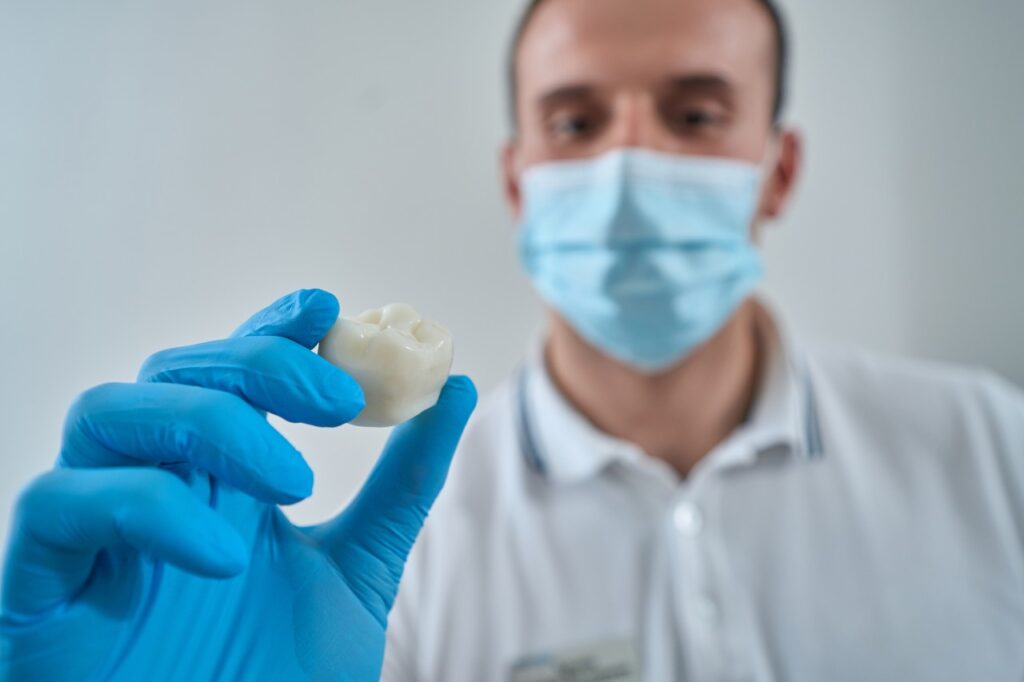Workers compensation Dentist in Chicago Loop

Worker's compensation dental providers
Work-related dental injuries are more common than you think! Did you know that out of all facial injuries at the workplace, 38.6% of those involve dental injuries? That’s a lot of accidents that require dental care. Unfortunately, however, not many dental work providers accept worker’s compensation cases and give care to those individuals.
While dental work associated with workers compensation requires a lot of work on the behalf of multiple parties (dental offices, an individual’s workplace, claims adjusters, etc), Chicago Loop Dentistry will stop at nothing to help restore your pearly whites back to their original condition. Whether you need function restored or the aesthetic look of your smile, Dr. Mehta does it all with the wonderful dental associates by her side.
Finding a dentist who understands and is willing to work in the workers comp system is challenging. It’s even more challenging if you have no clue where to start in the workers compensation dental provider process. While workers understand they have adequate coverage and compensation rights, not many know what happens after they’re injured. It’s critical that you understand this process so your illness is resolved as swiftly as possible.
Chicago Loop Dentistry is an all inclusive practice that will help you understand all different types of workplace dental injuries, what to do if you get a dental injury at work, helpful things to know about the worker’s compensation process, and how Dr. Mehta can help you return to your pre-injury state of health.
Types of Workplace Dental Injuries
There are many different types of workplace dental injuries you can sustain at work. Here’s an overview of some of them, how they commonly happen, and most common treatments for them. It’s important to note that each treatment plan is custom to each individual’s injuries. The most common treatments describe how a majority of these injuries are fixed by dentists and dental assistants.
Chipped Teeth
Getting chipped teeth on the job is one of the less serious and most common dental injuries people sustain. As its name sounds, a chipped tooth (or teeth) involves portions of your teeth separating from the rest of your tooth. Usually, the tooth (or teeth)’s enamel is knocked away, leaving the rest of the tooth exposed. Sometimes people don’t even notice when their teeth chip while others have a majority of their teeth chipped away.

How it Happens
There are so many ways chipped teeth happen. Everyone’s oral health and teeth strength is different, which means that different people may be more prone to chipping their teeth than others.
Chipping your teeth happens in a variety of ways. You can simply be eating a meal or have an object bluntly hit your mouth. In more serious cases, having a chipped tooth is just part of a dental injury sustained at work.
Common Treatments
Depending on the severity and location of a chipped tooth, some individuals don’t need their chipped teeth to be repaired. For most people, however, chipped teeth should be fixed as soon as possible to lower the risk of damage to the teeth’s structure.
The most common treatments for chipped teeth are dental fillings or bondings. If you have only a few teeth that need to be fixed, the procedure should take less than an hour in total. If you need multiple teeth repaired, expect the process to take a little longer. The good news is that you can eat normally after getting your teeth repaired. However, it’s best to wait roughly 48 hours to eat colored or staining foods, as the bonding or fillings may stain to be that color.
Knocked Out Teeth
Having your teeth get knocked out is a little more serious than having just a few of your teeth chip. Avulsed teeth as they’re also called are teeth that completely get knocked from your mouth, whether it be just the crown of your tooth or the entire tooth down to the root.

How it Happens
Our teeth are strong, so it takes a lot of strength to completely knock a tooth out. Teeth can get knocked out as a result of eating hard food, but it’s incredibly rare for that to be the sole cause of the tooth avulsion. Most of the time, this kind of injury is the result of a serious workplace injury such as being hit with a hard object or having something caught around the tooth and it ripping out.
Common Treatments
It’s important to get your tooth fixed as soon as possible if the whole thing is removed. It’s recommended that you get it fixed within 30-60 minutes of the removal so it properly adheres back into your mouth and you don’t sustain further injuries to your gums and the rest of your mouth. If you get a tooth knocked out and require immediate medical attention, call Dr. Mehta at Chicago Loop Dentistry. She’ll try to squeeze you in as soon as possible, and if she can’t, she’ll further guide you on what to do while you wait.
While you’re waiting to be seen by a dentist, there are some things you can do to prolong the life of your tooth. If the tooth is intact and you can safely retrieve it, gently grab it by the crown (never grab it by the root). Gently rinse it off with water if it’s dirty. Next, align the tooth back in your socket and press down with your fingers or hold pressure on it with your jaw.
Displaced Teeth
Displaced teeth are a little different from chipped or completely knocked out teeth. A displaced tooth hangs loosely from its socket and still remains in your mouth. Displaced teeth injuries vary in severity and can affect your nerves and blood vessels if serious enough.

How it Happens
Like other dental injuries, displaced teeth injuries occur in numerous ways. They happen by slipping and falling while at work, being hit by something, or having something catch on the tooth.
Common Treatments
It’s best to treat your displaced teeth as soon as possible so you don’t sustain further injury to your gums, jaw, or teeth. The goal with treating a displaced tooth is stabilization so the tooth can normally grow back and adhere itself in its socket. Some displaced teeth are splinted to your other teeth and fixed in that position for a few weeks to properly stabilize it.
Some displaced teeth aren’t severe enough to require treatment. In that case, your dentist will take regular x-rays and keep an eye on the overall health of that specific tooth and socket to ensure everything is healed and you aren’t experiencing any pain.
Mouth Tissue Injuries
Another common injury that you may sustain at the workplace are mouth tissue injuries. These involve any injuries you get to your gums, tongue, cheek, or lips. All these areas have numerous blood vessels and bleed a lot when injured- so don’t panic if you see a lot of blood with these injuries! Bruises, punctures, cuts, and lacerations are the most common mouth tissue injuries people get at the workplace.

How it Happens
Just as there are many soft tissue injuries, there are many ways these types of injuries occur. While some people only sustain bruises from falling or getting hit in the face with an object, others don’t fare so well. If you work with sharp objects, machinery, and other autonomous equipment, it’s possible to get cut, or hit with many different materials and sustain these injuries.
Common Treatments
Depending on the severity of your injuries, you may not need treatment at all for soft tissue injuries! With minor cuts and bruises, you may only need time for the affected area to heal properly. If you’re cut severely enough, you may need reconstructive surgery or stitches to ensure everything is in its place and heals properly.
TemporoMandibular Joint (TMJ) Symptoms
TemporoMandibular Joint symptoms are a specific type of jaw injury. People experience TMJ symptoms when the ligaments and muscles around their jaw become inflamed, sore, or otherwise irritated. Different people experience different TMJ symptoms. They present themselves as jaw tenderness, earaches, facial soreness/pain, and even persistent headaches that just don’t seem to go away.

How it Happens
There are numerous different causes to TMJ symptoms. They may appear more suddenly or take years to fully develop. An improper bite, arthritis, normal wear and tear, and blunt force workplace injuries are just a few of the causes for TMJ symptoms you experience.
Common Treatments
The severity of TMJ varies from person to person, so each individual will receive a different treatment plan that works best for them. Some treatments are non-invasive self treatments that mitigate soreness, while other treatments require corrective dental treatment to relieve symptoms. If you have concerns regarding possible TMJ symptoms, call Dr. Mehta at Chicago Loop Dentistry! She’ll hear you out, take a look at what’s going on, and implement a treatment plan fast so you can experience relief as soon as possible.
What To Do If You Get A Dental Injury At Work
It can be confusing, stressful, and overwhelming to know what to do when you get a dental injury at work. However, these tips and tricks will help you get on your way again so you don’t have to worry about anything but your health.
Depending on the extent of your injuries, you may be transported to a hospital to have diagnostic tests like x-rays, CT scans, or other related testing. You might need to have medical issues treated before dental work begins. Most hospitals are not equipped to deal with dental injuries, unfortunately, while some dentists don’t provide work-related injury care.
If you think you have a dental problem arising due to a workplace injury, talk to the hospital staff and have them document your current dental conditioning. Having proper documentation of an injury helps any future dental treatment move faster so you get back to your pre-injury state as soon as possible. Some dental problems show up quickly while others may take days, weeks, months, or even years to make an appearance.
If you have any questions about worker’s compensation, dental processes for worker’s comp cases, or other questions about dental care in general, call Dr. Mehta at Chicago Loop Dentistry at (312)-548-7795. Everyone here is incredibly helpful and wants to help you with whatever we can. We understand how stressful and annoying it is to take care of an injury involving dental work which is why we work as fast as possible to get you squared away and going back to work.
An Overview of the Worker’s Compensation Process
It’s helpful to understand the workers compensation process from injury to resolution. That way, you have a better idea of what to expect every step along the way.
You Sustain an Injury
As unfortunate as this seems, the first step in the workers comp process is when an employee sustains an injury. No matter how serious or non-serious the injury seems, that’s always the first step in the compensation claims process.

You Report the Injury
The first thing you need to do after sustaining a dental injury is report the injury. Again, no matter how serious or mild it seems to you, it’s always a good idea to report it to your employers so you can get the rest of the process started, get proper representation, and proper treatment based on your needs.
It’s a good idea to keep these things in mind when reporting your injury so your employer has as much information as possible regarding the accident:
- When the injury happened
- What the injury is
- How the injury happened
- Where the injury happened
- Any medical conditions that may worsen the severity of your injury
- Anything else that’s relevant to the situation causing the injury
Keeping proper documentation like this right away helps you and everyone else in the loop and prepared later on so you don’t have to do any guessing when it comes time to fill out all the forms you need.
You Begin Dental Treatment
After you notify your employer of the injury, it’s time to seek medical treatment right away. As you now know, some dental injuries are quite time sensitive and require immediate treatment in order for you to recover properly. Even if you sustain a minor injury while working, it’s a good idea to receive proper dental treatment as soon as possible so it doesn’t develop into other issues later on in life.
Depending on your employer’s worker compensation benefits, they may provide a referral for you to visit authorized medical providers in a network with costs covered by their insurance. If this is the case, it is wise to follow your employer’s wishes and visit one of the dental specialists that’s covered by their insurance.
However, if your employer and their insurance carriers don’t have a designated network of dental offices to visit, come to us at Chicago Loop Dentistry. We have the right tools and knowledge necessary to perform emergency and routine dental work that takes care of all your needs. We’ll get you squared away and back to work as soon as possible.

Your Employer Reports the Injury to Their Workers Compensation Insurance
After you receive medical treatment and you report this information to your employer, your employer will report this information to their workers compensation provider. There are forms your employer has to fill out when an accident occurs before they send them off to their comp provider. Once that happens and they submit all the necessary paperwork to the provider, they receive guidance about what to do next.
You Receive Information From Your Employer, Necessary Forms, Etc
After your employer submits all the necessary information to their workers compensation insurance, they receive forms and procedures about what you, the employee, needs to do next. You yourself may have to fill out a detailed form regarding the accident and the circumstances around it.
It’s also at this step where any medical forms and reports you receive while getting medical care are reported to the workers comp provider, too. This is to prove everything checks out and is valid on the reports your employer fills out. Medical reports and forms also include a detailed recollection of any injuries you sustain, how serious they are, the medical care provided, and possibly even a timeline of treatment and how long it takes you to fully heal before you can return to work.
After all paperwork is filled out, everything is sent back to the worker’s compensation provider so they have the ultimate say in whether or not your claim is officially accepted/denied.
The Employee’s Provider Denies or Accepts the Claim
Unfortunately at this step, you have to sit back and wait for a decision from the provider. They may request more information from you while you wait, but usually once you fill out all the forms the way they want, you should be good to go.
There are two results that have the possibility of happening once the provider has made their decision. Either they accept the claim or deny the claim.
If they accept the claim, they’ll contact your employer and you with payment details and any other compensation you get. Depending on the amount offered, you can either accept the amount or negotiate (with a worker’s compensation lawyer) a different sum based on the totality of the circumstances. The insurance company may or may not offer to pay you the total costs in medical expenses, procedures, further appointments, and any medication you need. If they do, then you likely don’t need to negotiate any further and you’re good to go.
If they deny your claim, you have a few options. Your first option is requesting a reconsideration from the compensation provider. They’ll go over everything you and your employer submitted again to see if there’s anything they missed.
The other option you have is filing a formal appeal. This takes a bit longer, however, you may have better results to get your claim accepted going this route. Filing a formal appeal is usually done through a state worker’s compensation board or other official governing body of people that look at all your circumstances as well as why you were denied in better detail.
You Return To Work
After a decision is made on your case and your treatment plan is completed, you can return to work. If your dental injury is extensive enough, you may even have a “return to work” plan that details you easing yourself back into your job. This is done to prevent further injury and for you to keep healing fully.
Chicago Loop Dentistry Is Here to Help You Out

Some dental offices don’t offer worker’s compensation services for numerous reasons. Some don’t have the manpower or proper knowledge about the ever complicated worker’s compensation process. Others can’t or don’t provide emergency medical services that some workplace injuries give people. Regardless of the reason, it’s frustrating to not get proper dental care because dental offices don’t offer them.
However, you don’t have to be frustrated anymore! Dr. Mehta and her wonderful team at Chicago Loop Dentistry can take on all sorts of worker’s compensation dental injuries, whether it’s an emergency or an injury that occurs months after an incident. At Chicago Loop Dentistry, we strive to work swiftly and in close conjunction with your employer, your employer’s worker compensation payer, insurance companies, and anyone else involved in your worker’s comp case.
Dr. Mehta and everyone else at Chicago Loop Dentistry have the necessary knowledge about proper forms and appropriate procedures regarding worker’s comp cases to give you the best care possible. If you have any questions about our processes and the types of cases we handle, feel free to give us a call at (312)-548-7795 so we can answer your questions and guide you along in the best way possible.


